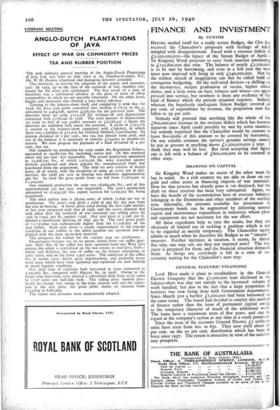COMPANY MEETING
ANGLO-DUTCH PLANTATIONS OF JAVA
EFFECT OF WAR ON COMMODITY PRICES TEA AND RUBBER POSITION
THE 30th ordinary general meeting of the Anglo-Dutch Plantations of Java Ltd. was held on July 23rd at 19, Fenchurch-street, Mr. W. H. Daukes (chairman and managing director) presided.
The chairman, in moving the adoption of the report and accounts, said: In 1939, up to the time of the outbreak of war, markets con- tinued for the most part unchanged. The first result of a state of hostilities was a substantial advance in the price of most of trose commodities in which we are specially interested. On the other hand, freight and insurance also showed a very heavy advance.
Turning to the balance-sheet itself, and comparing it with that for 1938, the Java cash profit converted into sterling at f.8.35 to the j,„ amounted to L484,708, against £356,592 for the previous year. The directors have set aside £113,138 for writings-off and depreciation compared with £118,046 in 1938. The total amount of depreciation set aside to date of our profits amounts to £2,238,442 a figure the directors are confident fully meets the position. A profit of L313,776 is carried to the balance-sheet compared with £198,622, in which there was a liability of Lt 1,000 for National Defence Contribution. An interim dividend of 2 per cent., less tax, has already been paid, and Out of the balance it is necessary to transfer £134,000 to income-tax reserve. We now propose the payment of a final dividend of 4 per cent., less tax.
Our standard tea production for 1939 under the Regulation Scheme amounted to 19,087,759 lbs. including native leaf. Of this standard about 621 per cent, was exportable. The actual production amounted to 13,366,190 lbs., of which 1,072,526 lbs. were exported against licences purchased and about 419,000 lbs. manufactured from leaf purchased from the population. The total tea area consists of 26,939 acres, all of which, with the exception of some 46 acres, are in pro- duction; the yield per acre in bearing was therefore approximately 480 lbs. In total the gross profit from tea fell from f.1,675,000 to f.1,509,00o.
Our standard production for 1939 was 18,984,562 lbs., and of this approximately 551 per cent, was exportable. The year's production amounted to 11,934,358 lbs., export licences for 1,129,353 lbs. being purchased.
The total rubber area is 38,094 acres, of which 13,899 are not in production. The year's crop gives a yield of 493 lbs. per acre from the area in bearing. A better price ruled during the first eight months of last year compared with that of 1938, and the active demand that took place after the outbreak of war increased our selling price by .73d. to 7.95d. per lb., against 7.22d. Our cost price at 3.39d. per lb. showed a satisfactory decrease of .83d. per lb. The total gross profit of f.1.737,662 was substantially higher than the f.1,190,8o3 of the year before. Each year shows a steady improvement in the average condition of our rubber as the oldest gardens are uprooted and re- planted with the most up-to-date material.
The prospects for rubber for the current year are satisfactory. Encouraging features are by no means absent from our coffee posi- tion. Now that all the coffee has been uprooted from our West Java estates, the whole is centralised on the two estates in mid-Java, Soeka- boemi and Kalimas, the area of coffee on the former amounting to 3,617 acres, and on the latter 1,410 acres. The condition of the coffee has in recent years shown great improvement, and gradually many weak areas which have been uprooted and replanted are now looking in much happier condition.
Our total crop of cinchona bark harvested in 1939 amounted to 1,350,985 lbs., compared with 889,021 lbs. in 1938. Owing to the larger crop harvested, costs showed a substantial drop from 25.07 cents to 17.27 cents per half-kilo bark. The selling price showed prac- tically no change but, owing to the large amount sold and the reduc- tion in the cost price, the gross profit shows an increase from f.153,619 to L687,693.
The report and accounts were unanimously adopted.






























 Previous page
Previous page